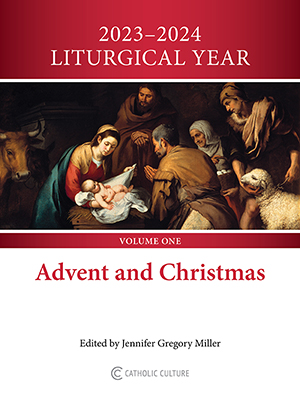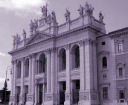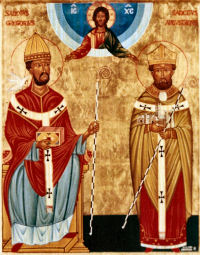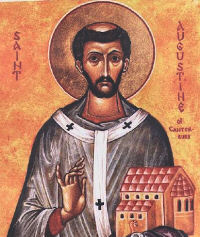Easter: May 27th
Saturday of the Seventh Week of Easter (Vigil of Pentecost); Optional Memorial of St. Augustine of Canterbury, Bishop
Free eBook:

|
| Free eBook: Liturgical Year 2023-2024, Vol. 1 |
» Enjoy our Liturgical Seasons series of e-books!
Today is the Optional Memorial of St. Augustine of Canterbury, who was born in Rome and died in Canterbury, England, in 604. When Pope Gregory I heard that the pagans of Britain were disposed to accept the Catholic Faith, he sent the prior of St. Andrew, Augustine, and forty of his Benedictine brethren to England. Despite the great difficulties involved in the task assigned to him, Augustine and his monks obeyed. The success of their preaching was immediate. King Ethelbert was baptized on Pentecost Sunday, 596, and the greater part of the nobles and people soon followed his example. St. Augustine died as the first Archbishop of Canterbury.
Tomorrow is the Solemnity of Pentecost, the end of the Easter season. Observance of the solemnity begins with First Vespers (Evening Prayer I) in the Liturgy of the Hours, and a special Vigil Mass before or after First Vespers. The liturgical day is from midnight to midnight in the Church's observance, except for Sunday and solemnities which begin with the evening of the preceding day.
The Pentecost Vigil liturgy has an Extended Form which echoes the Easter Vigil. There are four readings and Responsorial Psalms and prayers:
- 1st: Genesis 11:1-9 and Psalm 33(32): It was called Babel because there the Lord confused the speech of all the world.
- 2nd: Exodus 19:3-8a, 16-20b and Canticle of Daniel or Psalm 19 (18): The Lord came down upon Mount Sinai before all the people.
- 3rd: Ezekiel 37:1-14 and Psalm 107 (106): Dry bones of Israel, I will bring spirit into you, that you may come to life.
- 4th: Joel 3:1-5 and Psalm 104 (103): I will pour out my spirit upon the servants and handmaids.
>>>Today is Day 10 of the Pentecost Novena to the Holy Spirit.<<<
 The Vigil of Pentecost,
The Vigil of Pentecost, Station with San Giovanni in Laterano (St. John Lateran)
The Station is at St. John Lateran, beside the Baptistery. The night before Pentecost, like that before Easter, was at Rome, and in many other churches, a baptismal feast. Baptism was administered to those who, for one reason or another, had not received it at Easter; or to fresh candidates. Hence the resemblance between these two Virgils. It also expresses the idea of our Baptism by the Holy Spirit.
For more on San Giovanni in Laterano, see:
- Rome Art Lover
- Roman Churches
- Churches of Rome
- Aleteia
- Click here for a 360 degree virtual tour.
For further information on the Station Churches, see The Stational Church.
St. Augustine of Canterbury
 St. Augustine was the agent of a greater man than himself, Pope St. Gregory the Great. In Gregory's time, except for the Irish monks, missionary activity was unknown in the western Church, and it is Gregory's glory to have revived it. He decided to begin with a mission to the pagan English, for they had cut off the Christian Celts from the rest of Christendom. The time was favorable for a mission since the ruler of the whole of southern England, Ethelbert of Kent, had married a Christian wife and had received a Gaulish bishop at his court. Gregory himself wished to come to Britain, but his election as pope put an end to any such idea, and in 596 he decided to send an Italian monk following the comparatively new Rule of St Benedict. Augustine set out with some companions, but when they reached southern Gaul a crisis occurred and Augustine was sent back to the pope for help. In reply the pope made Augustine their abbot and subjected the rest of the party to him in all things, and with this authority Augustine successfully reached England in 597, landing in Kent on the Isle of Thanet. Ethelbert and the men of Kent refused to accept Christianity at first, although an ancient British church dedicated to St Martin was restored for Augustine's use; but very shortly afterwards Ethelbert was baptized and, the pope having been consulted, a plan was prepared for the removal of the chief see from Canterbury to London and the establishment of another province at York. Events prevented either of these projects from being fulfilled, but the progress of the mission was continuous until Augustine's death, somewhere between 604 and 609.
St. Augustine was the agent of a greater man than himself, Pope St. Gregory the Great. In Gregory's time, except for the Irish monks, missionary activity was unknown in the western Church, and it is Gregory's glory to have revived it. He decided to begin with a mission to the pagan English, for they had cut off the Christian Celts from the rest of Christendom. The time was favorable for a mission since the ruler of the whole of southern England, Ethelbert of Kent, had married a Christian wife and had received a Gaulish bishop at his court. Gregory himself wished to come to Britain, but his election as pope put an end to any such idea, and in 596 he decided to send an Italian monk following the comparatively new Rule of St Benedict. Augustine set out with some companions, but when they reached southern Gaul a crisis occurred and Augustine was sent back to the pope for help. In reply the pope made Augustine their abbot and subjected the rest of the party to him in all things, and with this authority Augustine successfully reached England in 597, landing in Kent on the Isle of Thanet. Ethelbert and the men of Kent refused to accept Christianity at first, although an ancient British church dedicated to St Martin was restored for Augustine's use; but very shortly afterwards Ethelbert was baptized and, the pope having been consulted, a plan was prepared for the removal of the chief see from Canterbury to London and the establishment of another province at York. Events prevented either of these projects from being fulfilled, but the progress of the mission was continuous until Augustine's death, somewhere between 604 and 609.
The only defeat Augustine met with after he came to England was in his attempt to reconcile the Welsh Christians, to persuade them to adopt the Roman custom of reckoning the date of Easter, to correct certain minor irregularities of rite and to submit to his authority. Augustine met the leaders of the Welsh church in conference but he unfavorably impressed them by remaining seated when they came into his presence — it is likely that in this he unfavorably impressed St Bede too. Augustine was neither the most heroic of missionaries, nor the most tactful, but he did a great work, and he was one of the very few men in Gaul or Italy who, at that time, was prepared to give up everything to preach the gospel in a far country.
—Excerpted from The Saints edited by John Coulson
Patronage: England.
Symbols and Representation: Banner of the crucifixion; King Ethelbert rising out of a font (Bishop baptizing a king); fountain; cross fitchée pastoral staff and book; cope, mitre and pallium;
Highlights and Things to Do:
- Pope Gregory brought the faith to different countries by sending groups of missionaries. Consider how you can help the missions, either monetarily or spiritually.
- St. Augustine has been called "Apostle of England" because of his missionary efforts. Pray to him today that England will return to the one true Faith.
- Read more about St. Augustine of Canterbury:
- Watch this video on the life of St. Augustine of Canterbury.
- St Augustine of Canterbury’s shrine was destroyed and his relics were lost during the English Reformation. Wikipedia has some further details.







